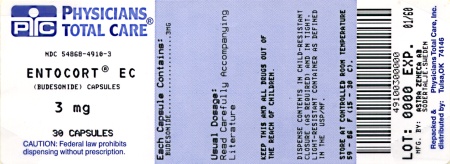
Entocort Ec | Budesonide Capsule while Breastfeeding
What is Entocort Ec | Budesonide Capsule used for?
Entocort Ec | Budesonide Capsule while breastfeeding safe or not? Can there be any side effects for infant while using it during breastfeeding?

Nursing Mothers The disposition of budesonide when delivered by inhalation from a dry powder inhaler at doses of 200 or 400 mcg twice daily for at least 3 months was studied in eight lactating women with asthma from 1 to 6 months postpartum.1 Systemic exposure to budesonide in these women appears to be comparable to that in non-lactating women with asthma from other studies. Breast milk obtained over eight hours post-dose revealed that the maximum budesonide concentration for the 400 and 800 mcg total daily doses was 0.39 and 0.78 nmol/L, respectively, and occurred within 45 minutes after inhalation. The estimated oral daily dose of budesonide from breast milk to the infant is approximately 0.007 and 0.014 mcg/kg/day for the two dose regimens used in this study, which represents approximately 0.3% to 1% of the dose inhaled by the mother. Budesonide plasma concentrations obtained from five infants at about 90 minutes after breast feeding (and about 140 minutes after drug administration to the mother) were below quantifiable levels (<0.02 nmol/L in four infants and <0.04 nmol/L in one infant). The recommended daily dose of ENTOCORT EC capsules is higher (up to 9 mg daily) compared with inhaled budesonide (up to 800 μg daily) given to mothers in the above study. The maximum budesonide plasma concentration following a 9 mg daily dose (in both single- and repeated-dose pharmacokinetic studies) of oral budesonide is approximately 5-10 nmol/L which is up to 10 times higher than the 1-2 nmol/L for a 800 μg daily dose of inhaled budesonide at steady state in the above inhalation study. Since there are no data from controlled trials on the use of ENTOCORT EC by nursing mothers or their infants, and because of the potential for serious adverse reactions in nursing infants from ENTOCORT EC, a decision should be made whether to discontinue nursing or to discontinue ENTOCORT EC, taking into account the clinical importance of ENTOCORT EC to the mother. Budesonide, like other corticosteroids, is secreted in human milk. Data from budesonide delivered via dry powder inhaler indicates that the total daily oral dose of budesonide available in breast milk to the infant is approximately 0.3% to 1% of the dose inhaled by the mother. Assuming the coefficient of extrapolation between the inhaled and oral doses is constant across all dose levels, at therapeutic doses of ENTOCORT EC, budesonide exposure to the nursing child may be up to 10 times higher than that by budesonide inhalation.
Entocort Ec | Budesonide Capsule Breastfeeding Analsys
Budesonide while Breastfeeding
SafeNon-significant levels of drug in the milk are found. The infant is further protected because of a low oral bioavailability. Most expert's opinion is that topical, oral or inhaled steroid medication is compatible with breastfeeding,
Entocort Ec | Budesonide Capsule Breastfeeding Analsys - 2
Budesonide while Breastfeeding
CAS Number: 51333-22-3
The amounts of inhaled budesonide excreted into breastmilk are minute and infant exposure is negligible. When taken by mouth, budesonide is only about 9% bioavailable; bioavailability in the infant is likely to be similarly low for any budesonide that enters the breastmilk. Most experts consider oral and inhaled corticosteroids, including budesonide, acceptable to use during breastfeeding.[1][2][3][4][5]
What if I already have used Entocort Ec | Budesonide Capsule?
Entocort Ec | Budesonide Capsule is safe in breastfeeding and should not create any health problem for your baby but in case you feel any health issue associated with Entocort Ec | Budesonide Capsule you should contact your doctor or health care provider. Be it pregnancy or lactation you shall keep your doctor informed.
I am nursing mother and my doctor has suggested me to use Entocort Ec | Budesonide Capsule, is it safe?
Definitely, Entocort Ec | Budesonide Capsule is safe in lactation for baby. No wonder your doctor has recommended it.
If I am using Entocort Ec | Budesonide Capsule, will my baby need extra monitoring?
No extra baby monitoring required while mother is using Entocort Ec | Budesonide Capsule
Who can I talk to if I have questions about usage of Entocort Ec | Budesonide Capsule in breastfeeding?
US
National Womens Health and Breastfeeding Helpline: 800-994-9662 (TDD 888-220-5446) 9 a.m. and 6 p.m. ET, Monday through Friday
UK
National Breastfeeding Helpline: 0300-100-0212 9.30am to 9.30pm, daily
Association of Breastfeeding Mothers: 0300-330-5453
La Leche League: 0345-120-2918
The Breastfeeding Network supporter line in Bengali and Sylheti: 0300-456-2421
National Childbirth Trust (NCT): 0300-330-0700
Australia
National Breastfeeding Helpline: 1800-686-268 24 hours a day, 7 days a week
Canada
Telehealth Ontario for breastfeeding: 1-866-797-0000 24 hours a day, 7 days a week
